Game Design for Academic Integrity: Strategies to Avoid Plagiarism
VerifiedAdded on 2023/06/17
|6
|1190
|123
Report
AI Summary
This report details a game design concept aimed at educating students about plagiarism and academic misconduct, promoting academic integrity through interactive learning. The proposed game, designed for online play, focuses on the consequences of plagiarism, methods for avoiding unintentional plagiarism, and the proper handling of information. It involves team-based activities where players answer questions related to different forms of academic dishonesty. The game's structure includes scoring systems and potential rewards to incentivize participation and knowledge retention. The report concludes that game design is an effective tool for fostering a culture of academic integrity and equipping students with the skills to avoid plagiarism in their academic pursuits. Desklib offers a range of similar resources for students.
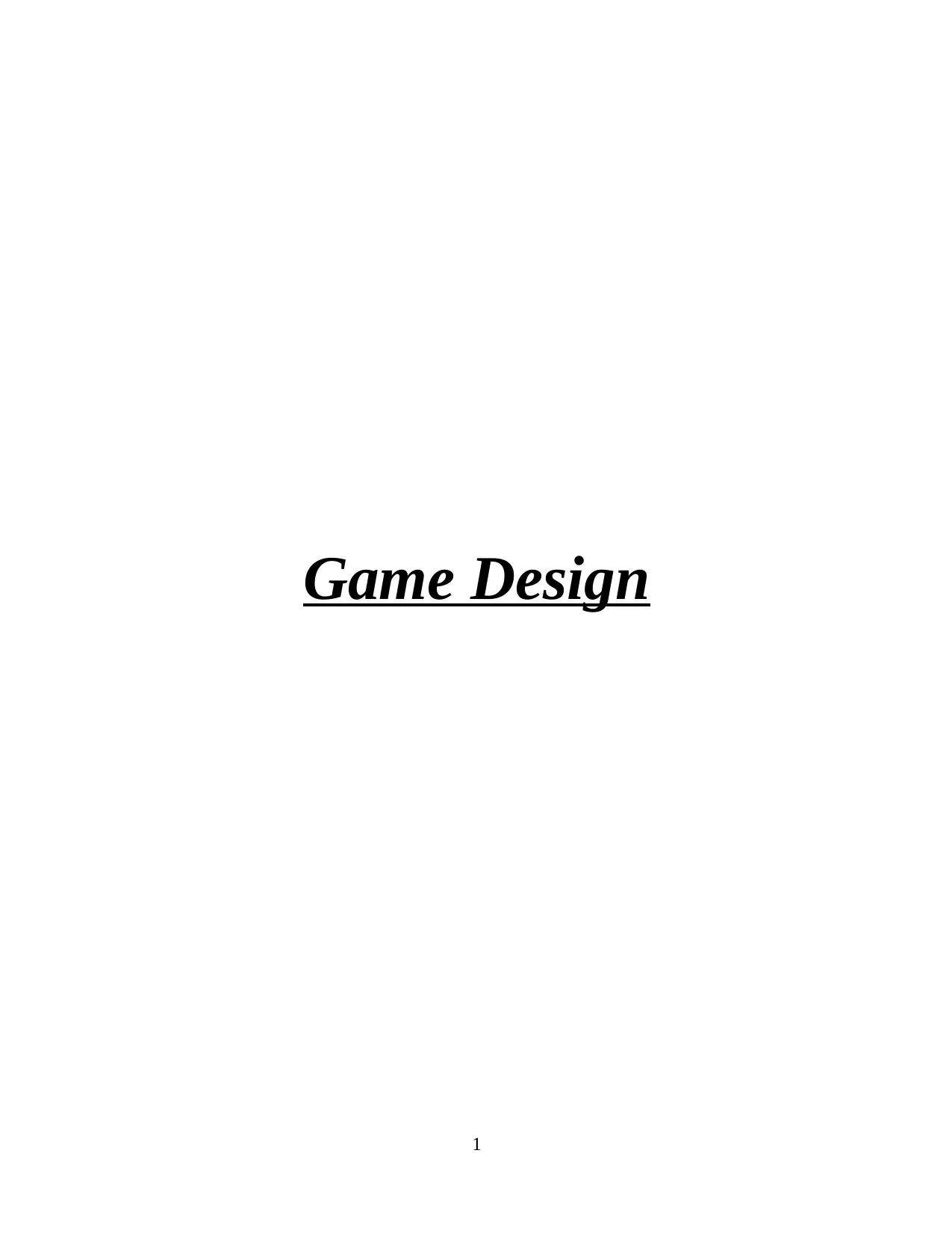
Game Design
1
1
Paraphrase This Document
Need a fresh take? Get an instant paraphrase of this document with our AI Paraphraser
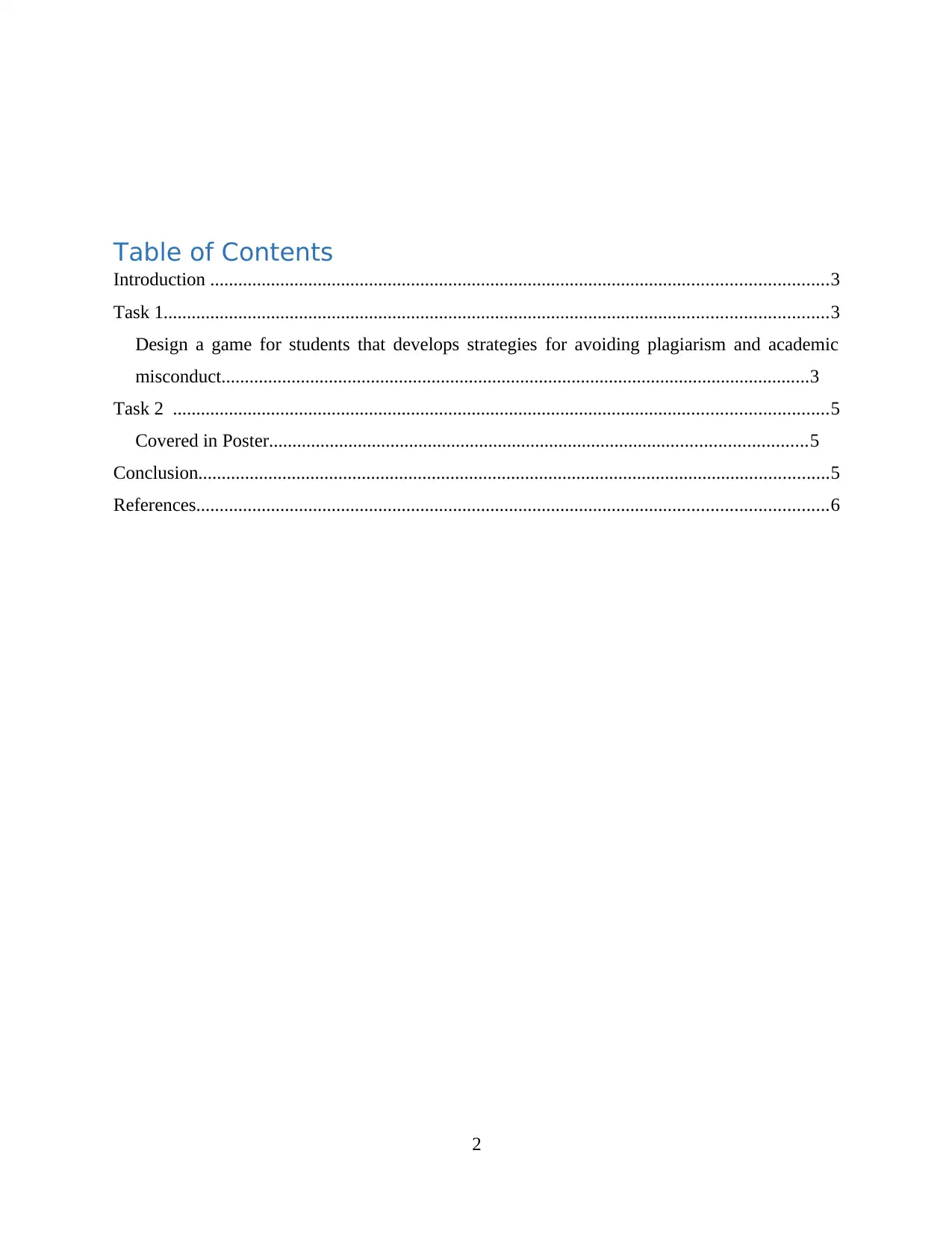
Table of Contents
Introduction ....................................................................................................................................3
Task 1..............................................................................................................................................3
Design a game for students that develops strategies for avoiding plagiarism and academic
misconduct..............................................................................................................................3
Task 2 ............................................................................................................................................5
Covered in Poster...................................................................................................................5
Conclusion.......................................................................................................................................5
References.......................................................................................................................................6
2
Introduction ....................................................................................................................................3
Task 1..............................................................................................................................................3
Design a game for students that develops strategies for avoiding plagiarism and academic
misconduct..............................................................................................................................3
Task 2 ............................................................................................................................................5
Covered in Poster...................................................................................................................5
Conclusion.......................................................................................................................................5
References.......................................................................................................................................6
2
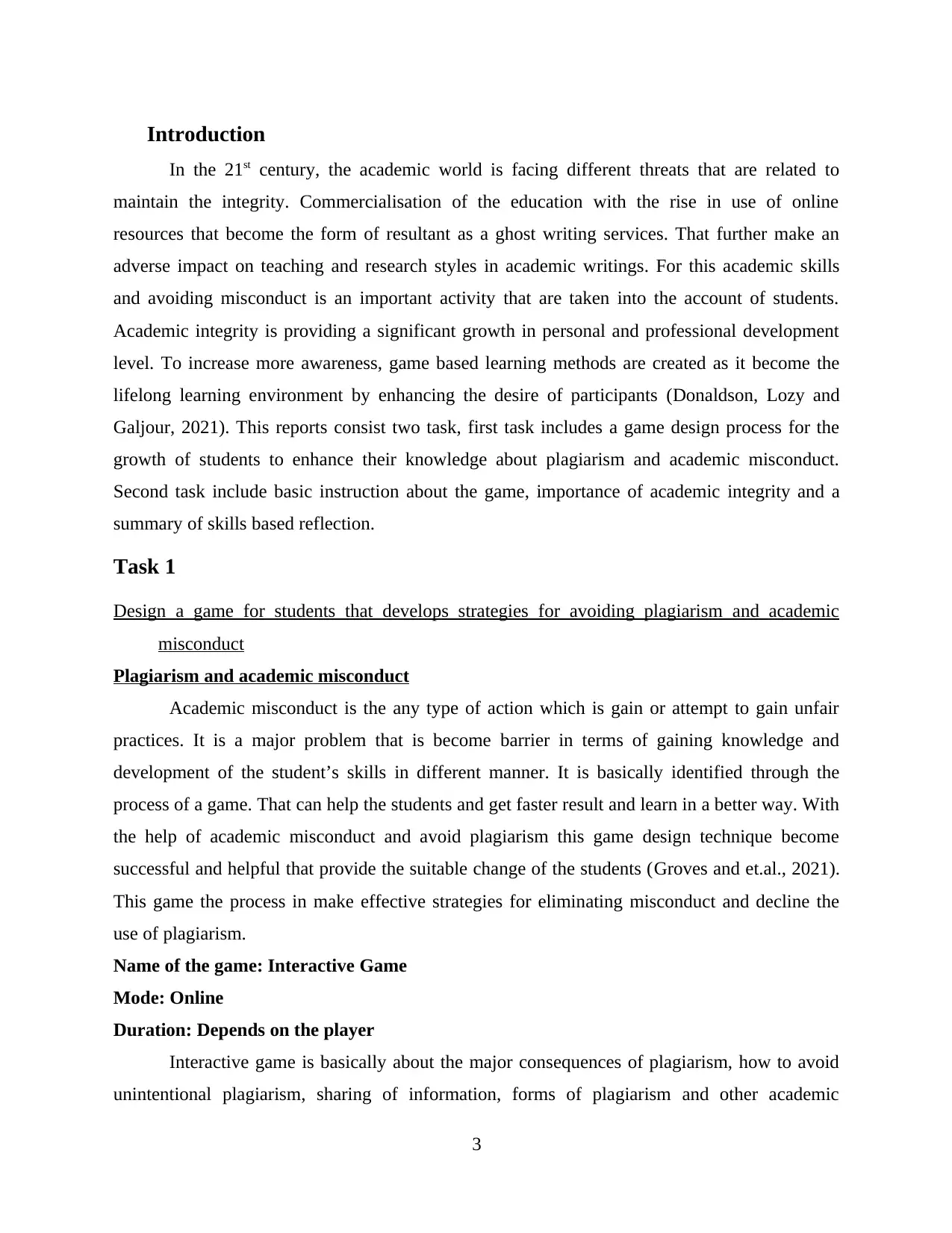
Introduction
In the 21st century, the academic world is facing different threats that are related to
maintain the integrity. Commercialisation of the education with the rise in use of online
resources that become the form of resultant as a ghost writing services. That further make an
adverse impact on teaching and research styles in academic writings. For this academic skills
and avoiding misconduct is an important activity that are taken into the account of students.
Academic integrity is providing a significant growth in personal and professional development
level. To increase more awareness, game based learning methods are created as it become the
lifelong learning environment by enhancing the desire of participants (Donaldson, Lozy and
Galjour, 2021). This reports consist two task, first task includes a game design process for the
growth of students to enhance their knowledge about plagiarism and academic misconduct.
Second task include basic instruction about the game, importance of academic integrity and a
summary of skills based reflection.
Task 1
Design a game for students that develops strategies for avoiding plagiarism and academic
misconduct
Plagiarism and academic misconduct
Academic misconduct is the any type of action which is gain or attempt to gain unfair
practices. It is a major problem that is become barrier in terms of gaining knowledge and
development of the student’s skills in different manner. It is basically identified through the
process of a game. That can help the students and get faster result and learn in a better way. With
the help of academic misconduct and avoid plagiarism this game design technique become
successful and helpful that provide the suitable change of the students (Groves and et.al., 2021).
This game the process in make effective strategies for eliminating misconduct and decline the
use of plagiarism.
Name of the game: Interactive Game
Mode: Online
Duration: Depends on the player
Interactive game is basically about the major consequences of plagiarism, how to avoid
unintentional plagiarism, sharing of information, forms of plagiarism and other academic
3
In the 21st century, the academic world is facing different threats that are related to
maintain the integrity. Commercialisation of the education with the rise in use of online
resources that become the form of resultant as a ghost writing services. That further make an
adverse impact on teaching and research styles in academic writings. For this academic skills
and avoiding misconduct is an important activity that are taken into the account of students.
Academic integrity is providing a significant growth in personal and professional development
level. To increase more awareness, game based learning methods are created as it become the
lifelong learning environment by enhancing the desire of participants (Donaldson, Lozy and
Galjour, 2021). This reports consist two task, first task includes a game design process for the
growth of students to enhance their knowledge about plagiarism and academic misconduct.
Second task include basic instruction about the game, importance of academic integrity and a
summary of skills based reflection.
Task 1
Design a game for students that develops strategies for avoiding plagiarism and academic
misconduct
Plagiarism and academic misconduct
Academic misconduct is the any type of action which is gain or attempt to gain unfair
practices. It is a major problem that is become barrier in terms of gaining knowledge and
development of the student’s skills in different manner. It is basically identified through the
process of a game. That can help the students and get faster result and learn in a better way. With
the help of academic misconduct and avoid plagiarism this game design technique become
successful and helpful that provide the suitable change of the students (Groves and et.al., 2021).
This game the process in make effective strategies for eliminating misconduct and decline the
use of plagiarism.
Name of the game: Interactive Game
Mode: Online
Duration: Depends on the player
Interactive game is basically about the major consequences of plagiarism, how to avoid
unintentional plagiarism, sharing of information, forms of plagiarism and other academic
3
⊘ This is a preview!⊘
Do you want full access?
Subscribe today to unlock all pages.

Trusted by 1+ million students worldwide
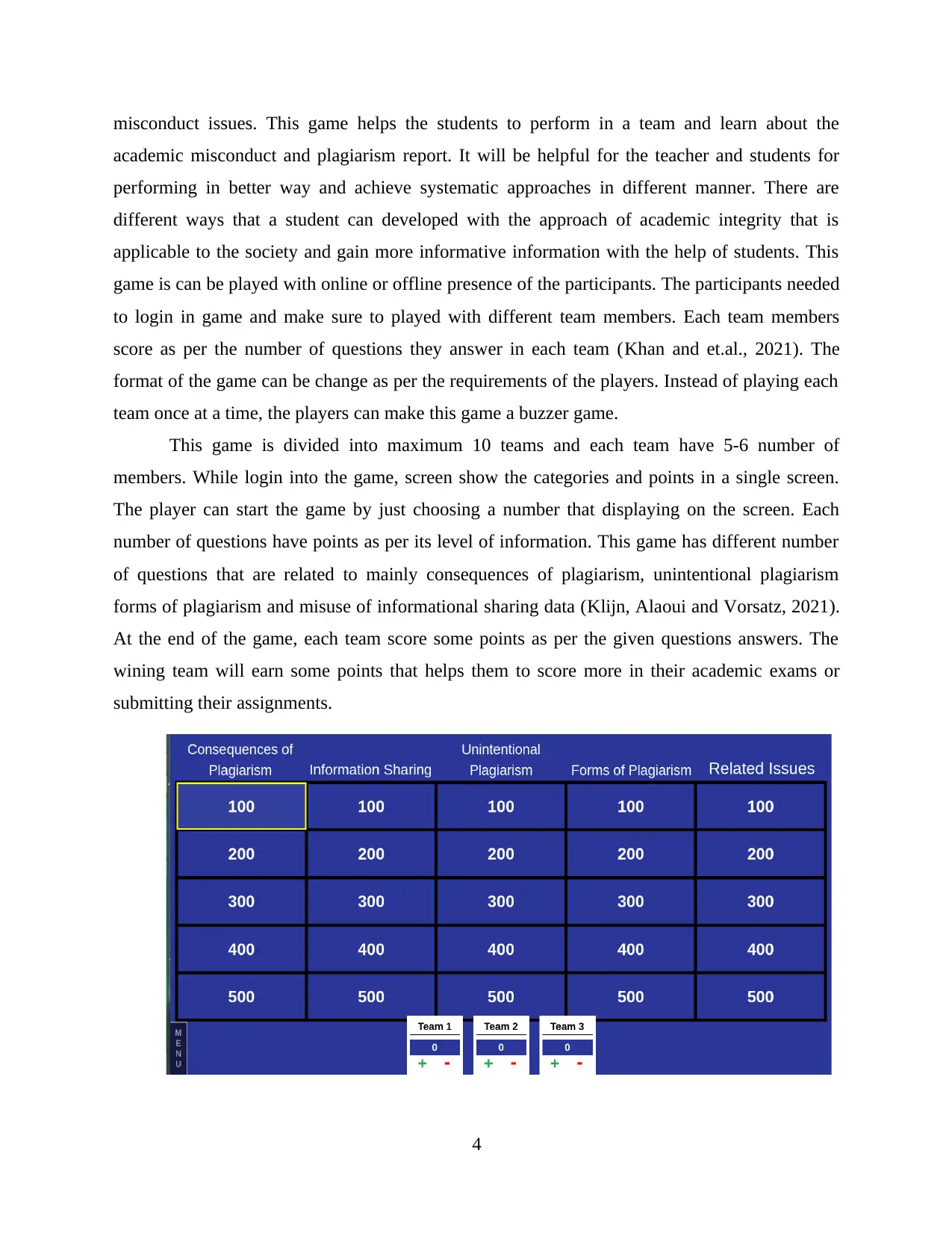
misconduct issues. This game helps the students to perform in a team and learn about the
academic misconduct and plagiarism report. It will be helpful for the teacher and students for
performing in better way and achieve systematic approaches in different manner. There are
different ways that a student can developed with the approach of academic integrity that is
applicable to the society and gain more informative information with the help of students. This
game is can be played with online or offline presence of the participants. The participants needed
to login in game and make sure to played with different team members. Each team members
score as per the number of questions they answer in each team (Khan and et.al., 2021). The
format of the game can be change as per the requirements of the players. Instead of playing each
team once at a time, the players can make this game a buzzer game.
This game is divided into maximum 10 teams and each team have 5-6 number of
members. While login into the game, screen show the categories and points in a single screen.
The player can start the game by just choosing a number that displaying on the screen. Each
number of questions have points as per its level of information. This game has different number
of questions that are related to mainly consequences of plagiarism, unintentional plagiarism
forms of plagiarism and misuse of informational sharing data (Klijn, Alaoui and Vorsatz, 2021).
At the end of the game, each team score some points as per the given questions answers. The
wining team will earn some points that helps them to score more in their academic exams or
submitting their assignments.
4
academic misconduct and plagiarism report. It will be helpful for the teacher and students for
performing in better way and achieve systematic approaches in different manner. There are
different ways that a student can developed with the approach of academic integrity that is
applicable to the society and gain more informative information with the help of students. This
game is can be played with online or offline presence of the participants. The participants needed
to login in game and make sure to played with different team members. Each team members
score as per the number of questions they answer in each team (Khan and et.al., 2021). The
format of the game can be change as per the requirements of the players. Instead of playing each
team once at a time, the players can make this game a buzzer game.
This game is divided into maximum 10 teams and each team have 5-6 number of
members. While login into the game, screen show the categories and points in a single screen.
The player can start the game by just choosing a number that displaying on the screen. Each
number of questions have points as per its level of information. This game has different number
of questions that are related to mainly consequences of plagiarism, unintentional plagiarism
forms of plagiarism and misuse of informational sharing data (Klijn, Alaoui and Vorsatz, 2021).
At the end of the game, each team score some points as per the given questions answers. The
wining team will earn some points that helps them to score more in their academic exams or
submitting their assignments.
4
Paraphrase This Document
Need a fresh take? Get an instant paraphrase of this document with our AI Paraphraser
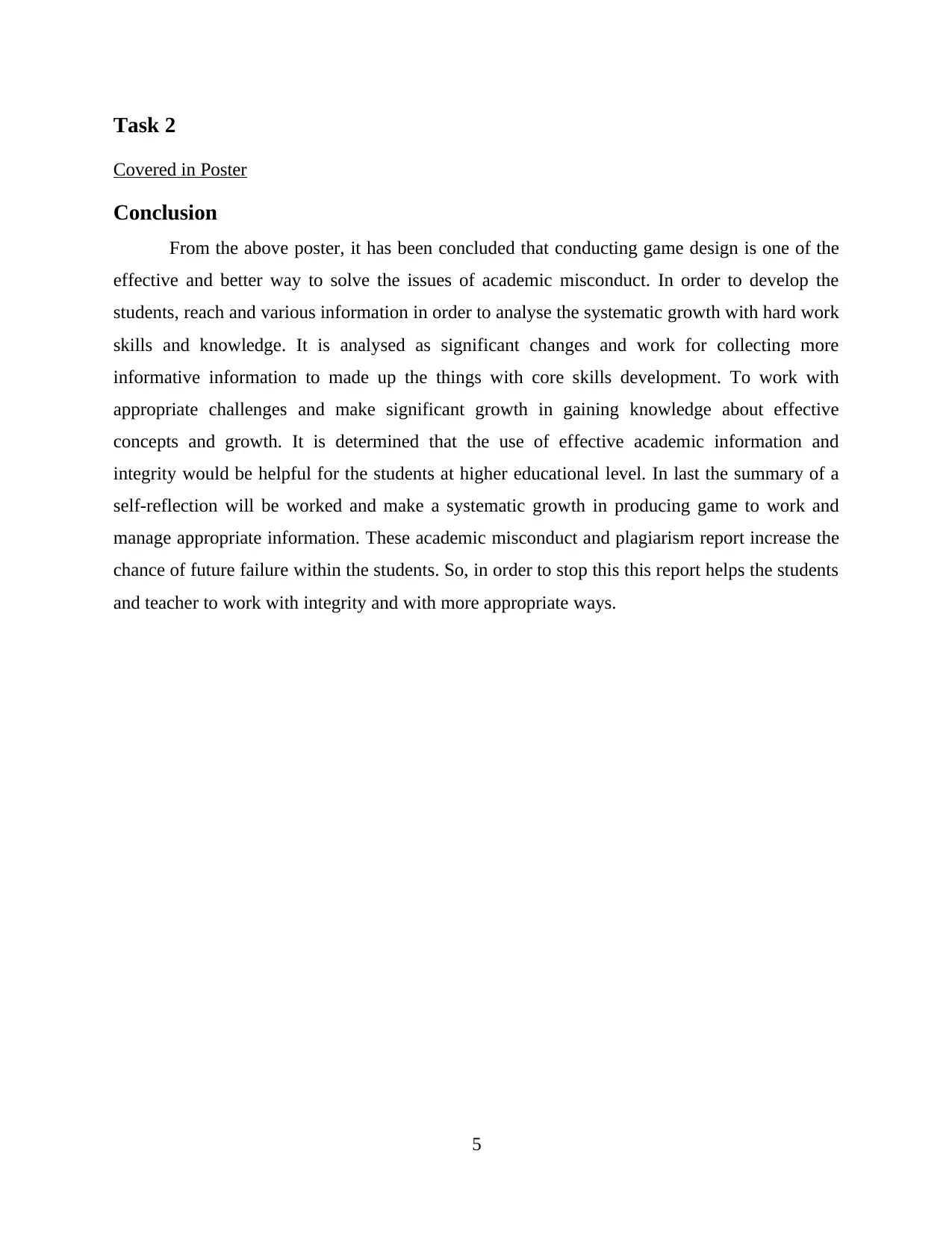
Task 2
Covered in Poster
Conclusion
From the above poster, it has been concluded that conducting game design is one of the
effective and better way to solve the issues of academic misconduct. In order to develop the
students, reach and various information in order to analyse the systematic growth with hard work
skills and knowledge. It is analysed as significant changes and work for collecting more
informative information to made up the things with core skills development. To work with
appropriate challenges and make significant growth in gaining knowledge about effective
concepts and growth. It is determined that the use of effective academic information and
integrity would be helpful for the students at higher educational level. In last the summary of a
self-reflection will be worked and make a systematic growth in producing game to work and
manage appropriate information. These academic misconduct and plagiarism report increase the
chance of future failure within the students. So, in order to stop this this report helps the students
and teacher to work with integrity and with more appropriate ways.
5
Covered in Poster
Conclusion
From the above poster, it has been concluded that conducting game design is one of the
effective and better way to solve the issues of academic misconduct. In order to develop the
students, reach and various information in order to analyse the systematic growth with hard work
skills and knowledge. It is analysed as significant changes and work for collecting more
informative information to made up the things with core skills development. To work with
appropriate challenges and make significant growth in gaining knowledge about effective
concepts and growth. It is determined that the use of effective academic information and
integrity would be helpful for the students at higher educational level. In last the summary of a
self-reflection will be worked and make a systematic growth in producing game to work and
manage appropriate information. These academic misconduct and plagiarism report increase the
chance of future failure within the students. So, in order to stop this this report helps the students
and teacher to work with integrity and with more appropriate ways.
5
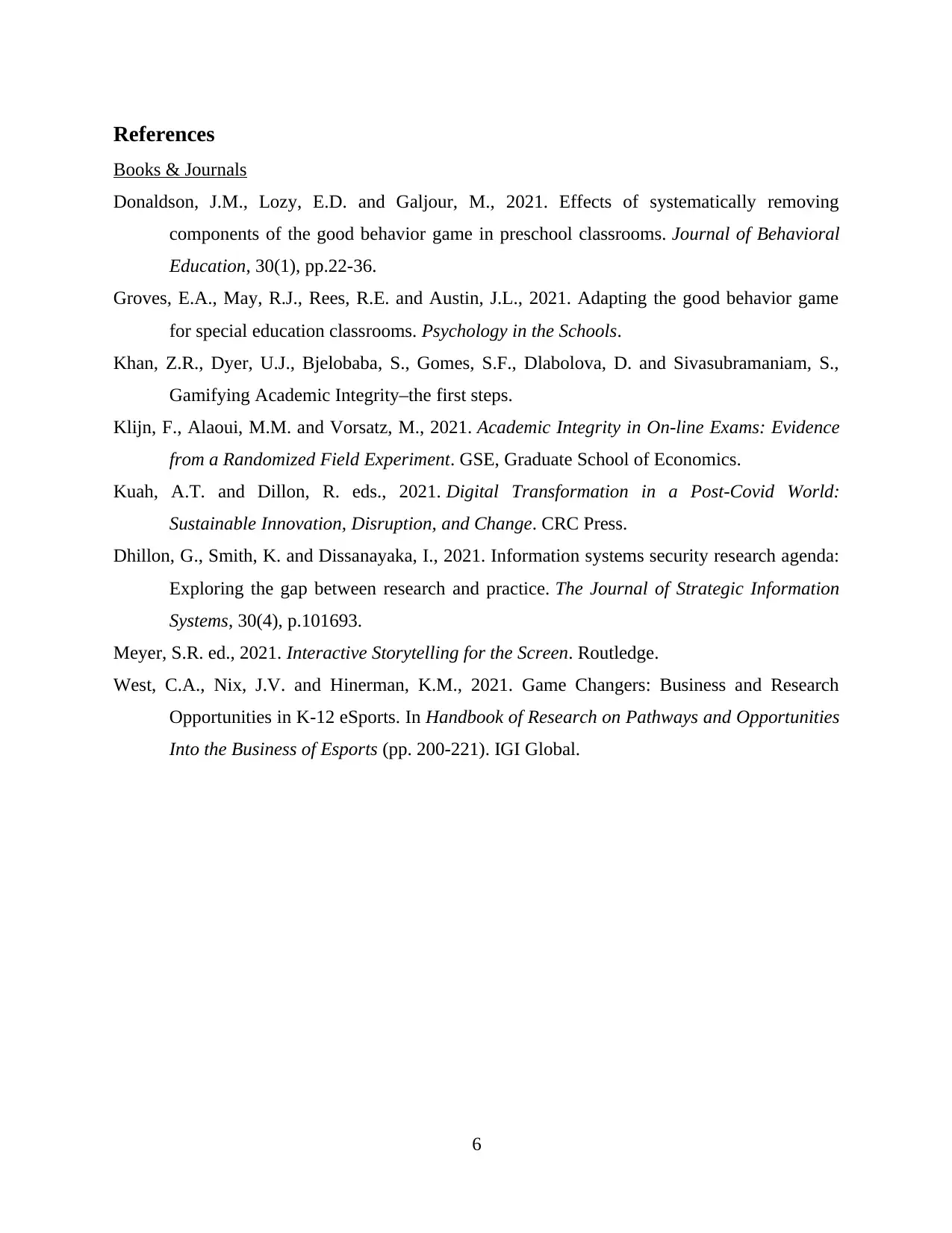
References
Books & Journals
Donaldson, J.M., Lozy, E.D. and Galjour, M., 2021. Effects of systematically removing
components of the good behavior game in preschool classrooms. Journal of Behavioral
Education, 30(1), pp.22-36.
Groves, E.A., May, R.J., Rees, R.E. and Austin, J.L., 2021. Adapting the good behavior game
for special education classrooms. Psychology in the Schools.
Khan, Z.R., Dyer, U.J., Bjelobaba, S., Gomes, S.F., Dlabolova, D. and Sivasubramaniam, S.,
Gamifying Academic Integrity–the first steps.
Klijn, F., Alaoui, M.M. and Vorsatz, M., 2021. Academic Integrity in On-line Exams: Evidence
from a Randomized Field Experiment. GSE, Graduate School of Economics.
Kuah, A.T. and Dillon, R. eds., 2021. Digital Transformation in a Post-Covid World:
Sustainable Innovation, Disruption, and Change. CRC Press.
Dhillon, G., Smith, K. and Dissanayaka, I., 2021. Information systems security research agenda:
Exploring the gap between research and practice. The Journal of Strategic Information
Systems, 30(4), p.101693.
Meyer, S.R. ed., 2021. Interactive Storytelling for the Screen. Routledge.
West, C.A., Nix, J.V. and Hinerman, K.M., 2021. Game Changers: Business and Research
Opportunities in K-12 eSports. In Handbook of Research on Pathways and Opportunities
Into the Business of Esports (pp. 200-221). IGI Global.
6
Books & Journals
Donaldson, J.M., Lozy, E.D. and Galjour, M., 2021. Effects of systematically removing
components of the good behavior game in preschool classrooms. Journal of Behavioral
Education, 30(1), pp.22-36.
Groves, E.A., May, R.J., Rees, R.E. and Austin, J.L., 2021. Adapting the good behavior game
for special education classrooms. Psychology in the Schools.
Khan, Z.R., Dyer, U.J., Bjelobaba, S., Gomes, S.F., Dlabolova, D. and Sivasubramaniam, S.,
Gamifying Academic Integrity–the first steps.
Klijn, F., Alaoui, M.M. and Vorsatz, M., 2021. Academic Integrity in On-line Exams: Evidence
from a Randomized Field Experiment. GSE, Graduate School of Economics.
Kuah, A.T. and Dillon, R. eds., 2021. Digital Transformation in a Post-Covid World:
Sustainable Innovation, Disruption, and Change. CRC Press.
Dhillon, G., Smith, K. and Dissanayaka, I., 2021. Information systems security research agenda:
Exploring the gap between research and practice. The Journal of Strategic Information
Systems, 30(4), p.101693.
Meyer, S.R. ed., 2021. Interactive Storytelling for the Screen. Routledge.
West, C.A., Nix, J.V. and Hinerman, K.M., 2021. Game Changers: Business and Research
Opportunities in K-12 eSports. In Handbook of Research on Pathways and Opportunities
Into the Business of Esports (pp. 200-221). IGI Global.
6
⊘ This is a preview!⊘
Do you want full access?
Subscribe today to unlock all pages.

Trusted by 1+ million students worldwide
1 out of 6
Related Documents
Your All-in-One AI-Powered Toolkit for Academic Success.
+13062052269
info@desklib.com
Available 24*7 on WhatsApp / Email
![[object Object]](/_next/static/media/star-bottom.7253800d.svg)
Unlock your academic potential
Copyright © 2020–2026 A2Z Services. All Rights Reserved. Developed and managed by ZUCOL.



